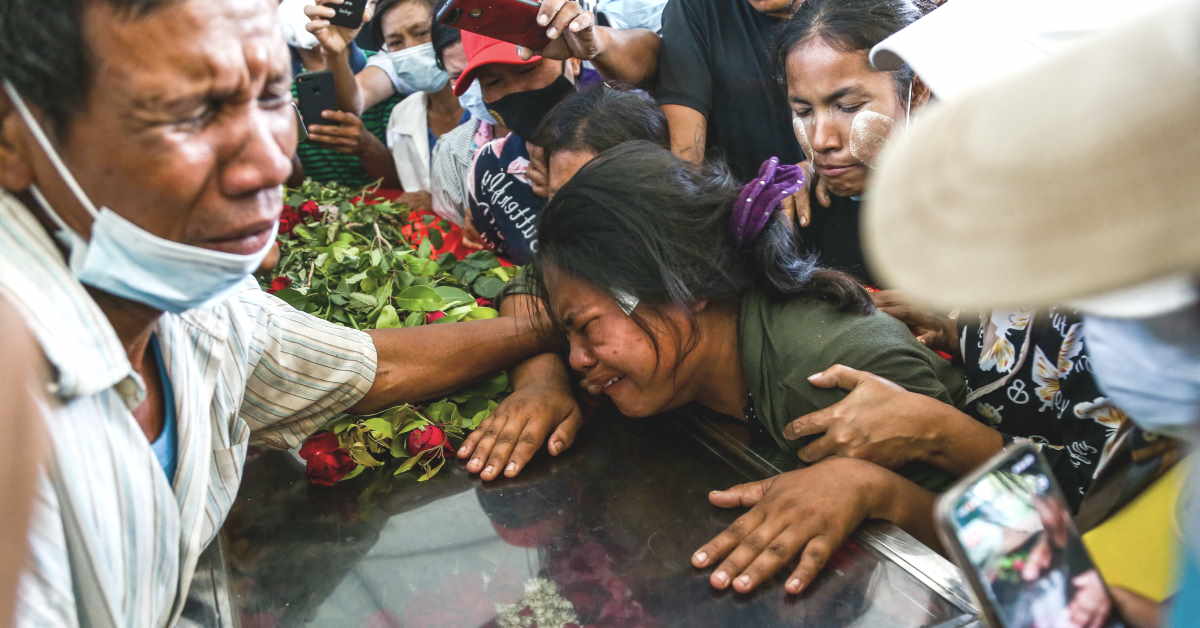Another anti-coup protester was shot dead in Myanmar on Friday as a United Nations (UN) envoy urged the Security Council to hear the nation's "desperate pleas" and take swift action to restore democracy.
Despite an increasingly brutal crackdown by the military authorities that has seen more than 50 people killed, protesters took to the streets again in towns around the country to denounce the 1 February coup.
In Mandalay, Myanmar's second largest city, hundreds of engineers took to the streets crying "Free our leader" in reference to ousted State Counsellor Aung San Suu Kyi, detained by the military since the first night of the takeover.
A 26-year-old man helping at barriers set up in the city to slow security forces died after being shot in the neck, medical officials said.
The killing follows the deadliest day of the crackdown so far on Wednesday, when the UN said at least 38 people were killed as graphic images showed security forces firing into crowds and bloodied bodies dragged away.
Police also fired tear gas at demonstrators in the southern city of Dawei while protesters in the commercial capital Yangon were defiant despite the danger.
"Scared, yeah, I'm very scared to stay on the frontline. But we believe in our comrades and we promise to protect each other if someone is injured," protester Didi, 27, said.
'Repression Must Stop'
The generals have shown no sign of heeding calls for restraint despite mounting international pressure, including targeted sanctions by Western powers.
The Security Council took up the escalating crisis on Friday and heard from the UN special envoy on Myanmar, Christine Schraner Burgener, who warned against any moves to grant legitimacy to the junta.
"Your unity is needed more than ever on Myanmar," Burgener told the closed-door session. "The repression must stop."
She said that she is receiving some 2,000 messages a day from Myanmar urging international action.
"The hope they have placed in the United Nations and its membership is waning and I have heard directly the desperate pleas – from mothers, students and the elderly," she said.
But she stopped short of urging international sanctions.
Myanmar's military has historically counted on support from veto-wielding Security Council member China, which has voiced misgivings about the coup but not joined Western nations in sanctions.
The UN special rapporteur on rights in Myanmar, Thomas Andrews, had earlier called for a global arms embargo on the country as well as an International Criminal Court (ICC) probe into alleged atrocities.
In a palpable sign of the opposition to the coup, Myanmar's newly appointed ambassador to the UN resigned, saying that his predecessor – sacked by the junta after dramatically condemning the seizure of power in a speech – remained the legitimate envoy.
Burgener saluted the ambassador, Kyaw Moe Tun, saying he was the representative of the elected government and needed the "full support" of Security Council powers.
'System Breakdown'
In Myanmar's north, a number of people have crossed the border into India in a bid to escape the crackdown.
Indian police said nine people had crossed the 1,600-kilometre (1,000-mile) frontier – three of whom were police officers who had refused to take part in putting down protests.
The junta has sought to stop news of the crackdown getting out, choking the internet and banning Facebook, the most popular social media platform in the country.
But live video feeds and recorded footage are leaking out daily, and on Friday the junta suffered from its own internet ban as YouTube shut off a number of military-run channels.
Friday also saw many parts of the country hit by power cuts for several hours, though it was not clear that this was a deliberate measure in a country where infrastructure is sometimes unreliable.
Government agencies attributed the outage to a "system breakdown".
Last month's coup brought a crashing halt to a decade-long experiment with democracy in Myanmar, which was previously under military rule for nearly five decades.
The country's generals have historically had few qualms about brutally suppressing dissent, crushing major protest movements in 1988 and 2007.
Suu Kyi's National League for Democracy (NLD) won November elections by a landslide, but the military insisted the polls were rigged as a justification for seizing power. – AFP
